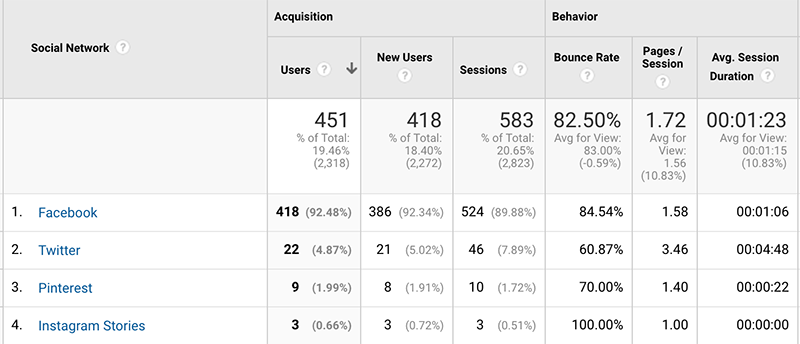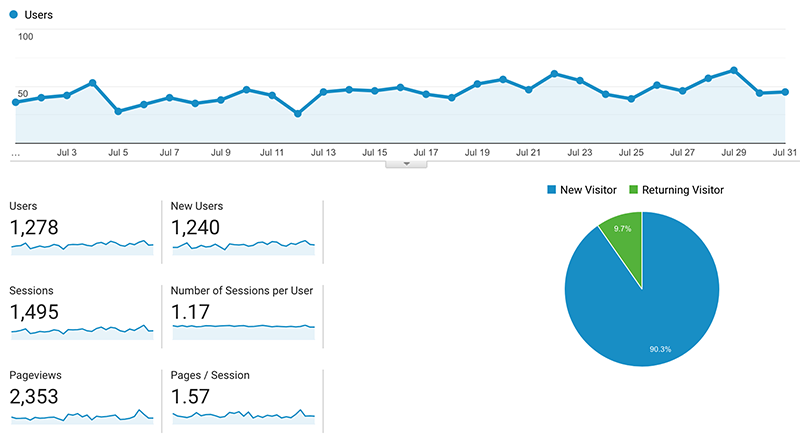How fast can a new blog make money? (July report)
Welcome back to my blogging experiment.
As you may already know, in January, I started a brand new blog with the goal of seeing if I can make money through blogging within a year. Every month, I share some details as I work (in my spare time) to see if I can grow said blog to a point where it starts earning some money.
So far, we’ve seen some great growth in search traffic and domain authority month-over-month, but no actual income yet. So, how did July shape up? Here are the answers:
(Psst, this post may contain affiliate links, which means if you purchase something through one of my links, I get a commission at no extra cost to you.)
Goodbye Pinterest
For many bloggers, Pinterest is a huge source of traffic. But from everything I’ve read and seen, if you want Pinterest to become such a boon to your blog, you have to put in a lot of time on Pinterest itself.
Bloggers in my groups are spending hours, pinning 50 pins a day, joining pin-each-other’s-stuff groups, and working hard to make it happen on the platform. And for many, it’s working!
But with all that in mind, I’ve decided Pinterest isn’t part of my strategy at this time. Because I have limited time I can spend on this blog and the thing I’m best at (and, importantly, the thing I enjoy doing) is writing good SEO content and guest posting.
My Pinterest efforts so far bring in very little traffic (see chart below) and that traffic doesn’t spend much time on my site. So, at least for now, I’m going to focus my energy elsewhere.
As for social media, Facebook is the place the brings me the most value.

Why I don’t (and won’t) have a Facebook page
So, since Facebook is my top social media referrer, here’s a question you might have: Why don’t I have a Facebook page?
There are a couple reasons.
1. I don’t like pages. I find them impersonal and spammy. I so much prefer to see people posting their news and blog posts and stuff on their own personal pages. And so my own preferences make me lean toward not having a Facebook page for the blog.
That’s not particularly scientific or strategic, but there are some blogging and marketing decisions I make simply because they resonate with me.
2. On a much more strategic note, there’s this: Facebook page posts rarely show up in people’s timelines. Facebook wants to make money and so it charges pages (e.g. businesses) to boost their content. Even if you follow pages, chances are you don’t see much of what they post. Because Facebook’s algorithm de-prioritizes them if they don’t pay to boost.
If you’re a business, you’re probably just stuck with that reality. If you’re an individual, though, sharing on your personal page is more effective.
Marketing etiquette 101
This is a total side note, but it’s worth bringing up because I’ve seen a lot of faux pas going on lately:
If you’re building a blog from scratch and hoping to monetize, spamming people is NOT a good way to try and get more readers.
So, what is spam? It’s anything people didn’t ask you for.
It’s when you send internet strangers invites to like your Facebook page (and especially when you send those invites over and over). It’s when you email internet strangers asking them to promote you without there being anything in it for them.
I posted about this recently on Facebook and several people chimed in to say that it isn’t just internet strangers. They also don’t want endless page like requests and promo requests from friends. So tread lightly even when dealing with people you do know.
But Gigi, I hear you saying: If I can’t send invites, how do I get readers?
The answer is by providing value. Write a valuable guest post at a blog that accepts them (and do your research; if a blog doesn’t accept guest posts, don’t send them one). Get an article placed in a magazine. Offer to be a guest on a podcast on a topic you know a lot about. Share useful stuff in Facebook groups, where allowed and relevant. Offer to collaborate with people in blogging groups. And write good, sharable, SEO-friendly stuff on your blog.
Importantly, also know who your audience is. If you’ve just started writing a blog on DIY home projects for beginners, people who have been doing and writing about DIY projects for 20 years probably don’t fall into that “beginner” category. If I’ve been a digital nomad for seven years (which I have), your blog on how to become a digital nomad isn’t for me. When picking places to guest post or share in Facebook groups, don’t go after experts if you’re writing for beginners – and vice versa.
Building an audience takes a lot of time. But your people will find you if you create valuable things for them and find ways to put them out in the world without spamming anyone.
Let’s talk SEO
On a recent monthly report, someone asked me to talk a bit more about what I do for SEO. So, here’s a breakdown of what I do on each post:
1. Research keywords (using KeySearch) that people search for on search engines.
2. Write useful content with short paragraphs, lots of white space, and headers wherever they make sense. (Search engines love content that’s easy to skim.)
3. Incorporate keywords where relevant in the headline and text.
4. Write a meta description that tells searchers what the post is about.
5. Include descriptive alt tags on every photo. (These help visually impaired readers and search engines.)
6. Link to other relevant posts on my site. (If I’m writing about great desserts in Interlaken, Switzerland, I’ll also mention that there’s an organic farmers market and link to my market post, for instance.)
7. Link to other relevant sites where I can. (Google likes links! Link out to other relevant content where you can.)
8. Write a descriptive browser title with keywords included if possible.
9. Size images appropriately so that they don’t slow down page load time, if possible.
Domain Authority
My domain authority (a score that tells you how likely you are to rank in Google) is holding steady at 22. The biggest leaps I’ve seen in that number all happened early in the year when I was relentlessly submitting guest posts to other blogs.
When I have some time again, that’s probably where I’ll spend more energy to keep pushing my ranking likelihood upward.
July blog traffic
Good news! Blog traffic is still on the upswing. In June, I had 756 visitors. In July, as you can see, that number rose to 1278. Pageviews also rose by about 1000.

Search traffic
Much of the growth going on at the new blog is happening through search. Over 900 of the above visits came from search engines in July.
How’s the research-intensive content doing?
In May, I talked about how I was starting to write longer, more research-intensive pieces of content. In July, I published two of them:
Are dogs allowed in restaurants in Europe?
and
Are dogs allowed in restaurants in North America?
So far, not a lot has happened with these search-wise, but since Are dogs allowed in restaurants in France? is my top post for search, I’m still hopeful that these others will be really valuable SEO pieces.
July spending
As usual, I spent $0 in my quest to grow the new blog. It’s all time and effort at this point.
July blog earnings
Still nothing. Which is definitely what I expected. Blog-building takes a lot of time, even if you know what you’re doing. It is most definitely not a get-rich-quick scheme, no matter what people selling courses tell you.
Can you make money within a year? Maybe. Hopefully. And we shall see. But most of us are going to see zero return for a long while. Especially if we’re doing it while also balancing a day job and other commitments.
I want these reports to be as detailed, interesting, and helpful as possible, so let me know if there’s something else you’d like to know or something I can do to improve them!
Comments
-
-
Willow
Thanks for sharing the latest, Gigi. I have an SEO question. When you find a longtail phrase that has the volume of searches you like, is it important to use exactly that phrase, or is it ok if it’s slightly different?

Viv Highton
Super relevant as always. I will be referring back to this post as I build up an arm of business. Thanks Gigi!